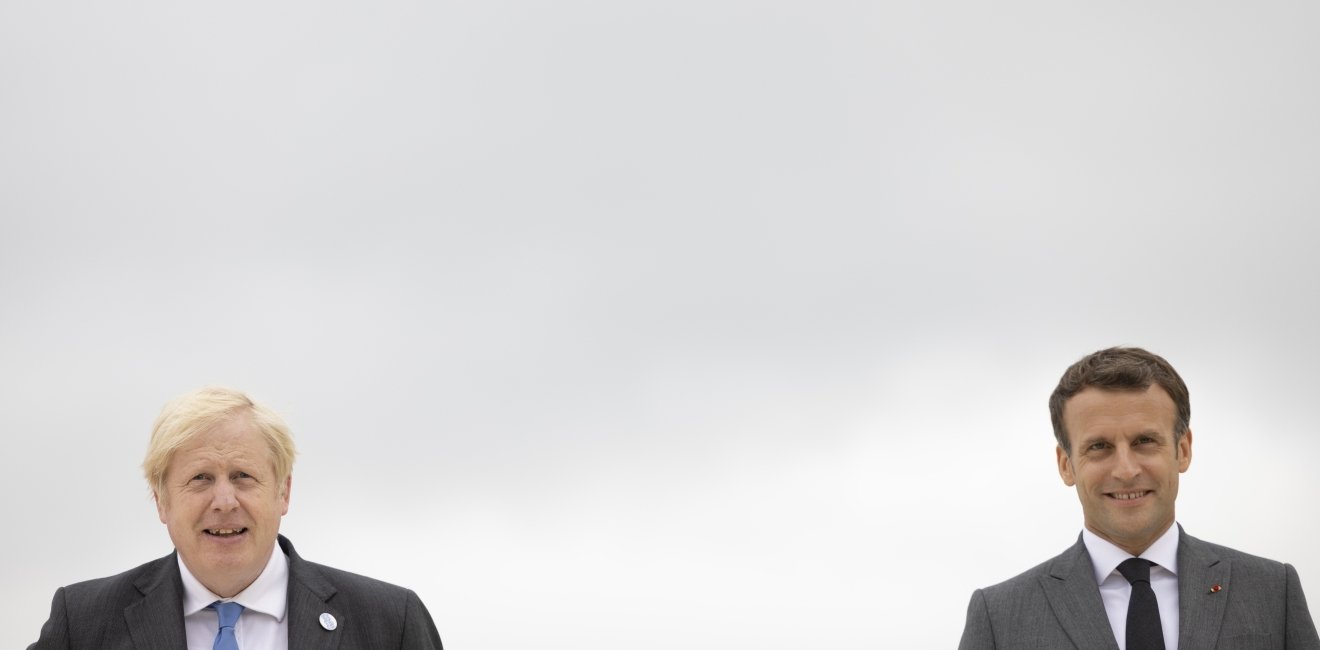Prime Minister Boris Johnson’s determination that there be no separation between Britain and Northern Ireland in the negotiations to leave the European Union (EU) results in, perhaps, the most difficult issue in the Brexit process. Johnson follows Prime Minister Teresa May in this commitment to treat Northern Ireland as an integral part of the United Kingdom (UK). But Brussels has other ideas. The EU is concerned that international traders could ship products to the UK, with its less rigorous standards on animal welfare, food, medicines and electronic goods, and then enter the EU through Northern Ireland’s border with the Republic of Ireland, one of the EU’s 27 member countries. For Brussels, a customs border with check points has to exist.
The question is where? The Irish Sea divides Northern Ireland from the rest of Britain and would require checks at ports, as well as policing across the waters. The land border on the island of Ireland had seen years of troubles, as the wealthier and predominantly Protestant Northerners fought with their Catholic and less wealthy countrymen. Peace came in 1998 with the Belfast Agreement/Northern Ireland Agreement, which did away with the land border and facilitated cross border traffic of people and goods. U.S. Senator George Mitchell (D-Maine) and UK Prime Minister Tony Blair mediated the peace accord, which has held well enough and is supported vigorously by the American president of Irish ancestry, Joe Biden.
From the beginning of the Brexit withdrawal negotiations, the question of where to draw the border was the toughest issue in Teresa May’s negotiations with Brussels. Should all of the UK remain within an EU customs area or should only Northern Ireland remain within the customs area? Parliament rejected the former, but the latter became the fall-back position or ‘backstop.’ Northern Ireland would remain within the EU customs area with standard checks until such time as a future withdrawal and future trading agreement was achieved. That agreement should resolve the problems of tariffs by using software to determine rates and payment schedules, not customs’ officers manning reinforced cement border blocks. EU president Donald Tusk remained firm saying “there will be no Withdrawal Agreement without a solid, operational and legally binding Irish backstop.” Both the Withdrawal Agreement of February 2020 and the UK-EU Trade Cooperation Agreement (TCA) of December 2020 were rushed through to meet deadlines and both failed to resolve the ‘backstop.’ When Johnson became prime minister in 2018 he pledged to scrap the ‘backstop’ altogether, claiming that it was ‘anti-democratic” and “inconsistent with the UK’s final destination.’ The Democratic Unionist Party agreed with him and trade experts found no good solution to the problem. He therefore signed onto the ‘backstop’ by another name as a way to allow him to negotiate a distant relationship with the EU for the rest of the UK. Inevitably, that meant a regulatory and customs border in the Irish Sea.
The Northern Ireland Protocol of February 2021 stated that Northern Ireland could not be used as a transit point to export UK goods that undercut businesses in the EU by providing subsidies or relaxing competition rules. Highly reputed solicitor James Webber cited the example of a Nissan car, made in its British Sunderland factory with a government subsidized new battery. The sale of that Nissan car competed with a German-made Volkswagen and thus affected trade between Northern Ireland and the Republic of Ireland. Consequently, it was subject to the Protocol.
The Protocol also sought to ensure that food which was not produced, processed or packaged under strict EU regulations and standards could enter the European market. Thus, the introduction of EU restrictions on UK sausages and cold meats, which have triggered the so-called UK-EU “sausage war,” with heated statements from both the French President and the British Prime Minister. Both have chosen to ignore that Northern Ireland produces its own sausages from local suppliers. Marks and Spencer, with 20 stores in Northern Ireland, gets its entire chilled sausage stock from Northern Ireland. Other major supermarkets have a proud sausage making tradition: “People here like their sausages from the butcher’s and even if they go the supermarket they’ll go for a local brand.”
Under the Protocol, UK goods, including cold meats, could move across the Irish Sea into Northern Ireland without health checks for a limited time. The grace period ends on June 30, which brings us to the tense situation today. Boris Johnson is determined to reject any limitations on UK sovereignty and create friction across the Irish Sea. He is adamant in asserting the UK’s sovereign rights and rejecting Brussels’ attempts to interfere in internal commerce with nit-picking regulations. Private businesses on both sides of the Irish Sea fear a deluge of export health certificates and expensive physical inspection for animal products alone. They recognized that the Protocol was unworkable and now need a more flexible approach.
Brussels has suggested that the UK sign up to the EU’s food standards, but this violates Johnson’s commitment to regulatory autonomy and sovereignty. At the G7 meeting in Cornwall on June 11, positions hardened. The Prime Minister asserted that no unnecessary regulations would impede the passage of people and goods across the Irish Sea, while the German Chancellor and the French President stuck to their guns that an international commitment is a binding agreement. Johnson cannot ignore it without peril of retaliation from the EU.
In May, the French threatened retaliation over the exclusion of French fishermen from the waters around the UK’s Channel Island of Jersey. Brussels imposed burdensome paperwork on the sale of crayfish and other crustaceans fished in UK waters. The EU Commissioner for Financial Services, Malread McGuiness, added to the conflict by stating that the EU would delay UK access to European financial markets, traditionally a major contributor to the UK’s balance of payments. Based on lack of trust in the UK Prime Minister, the EU threatened to eject the UK from Horizon 2020, the EU fund for scientific research and development. Given the UK’s prominence in mathematics and software computing, the threat is likely to harm both European and British scientists who work collaboratively on a number of innovative projects. It reflects the level of distrust and animosity between EU members and Boris Johnson’s government.
Boris Johnson has been flippant in his attitude towards EU regulations and cavalier in his willingness to breach the trust that keeps the bloc of 27 together. Without that trust, moving forward on the Northern Ireland Protocol is impossible. London and Brussels must develop a degree of cooperation if they wish to follow through on the commitments made both on the Protocol and the broader TCA. They have created a UK-EU Joint Committee to oversee the implementation of the Protocol. This is expected to seek technical fixes and perhaps push the boundaries of what the EU would normally accept. However, politicians have to stand back and allow agreement on technicalities to submerge cries for sovereignty and legal purity. Otherwise, the Protocol could become an ‘unexploded ordnance.’
Author


Global Europe Program
The Global Europe Program is focused on Europe’s capabilities, and how it engages on critical global issues. We investigate European approaches to critical global issues. We examine Europe’s relations with Russia and Eurasia, China and the Indo-Pacific, the Middle East and Africa. Our initiatives include “Ukraine in Europe”—an examination of what it will take to make Ukraine’s European future a reality. But we also examine the role of NATO, the European Union and the OSCE, Europe’s energy security, transatlantic trade disputes, and challenges to democracy. The Global Europe Program’s staff, scholars-in-residence, and Global Fellows participate in seminars, policy study groups, and international conferences to provide analytical recommendations to policy makers and the media. Read more

Explore More
Browse Insights & Analysis
Water Security at the US-Mexico Border | Part 1: Background

China and the Chocolate Factory

Ongoing Debate: The Prohibition of GMO Corn in Mexico



